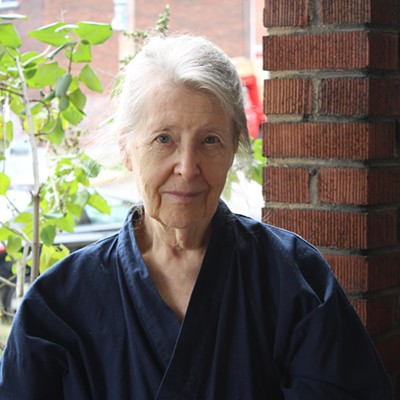For Americans these days, international travel has become at least mildly subversive. Leaving and entering the country are both a bit harder -- a lot harder if the corresponding nation is, say, Cuba -- and much of the news we get is filtered through the crudely politicized mesh of the war on terror. Either that, or it's media conglomerates telling us about the steady progress of globalization in countries from which they hope to profit. As surely and frighteningly as a lava flow, the world is changing, but the powers that be (and that act as our eyes and ears overseas) give us only glimpses, and even those are tuned primarily to the pitch of crises, of wars and disasters, rarely the more significant tenor of everyday life.
One antidote to narrow views and short attention spans is Pico Iyer. Born in 1957 in Oxford, England, of Indian parents, Iyer grew up in California, lives in Japan, travels the world and writes about it in publications including Condé Nast Traveler, The New York Times Book Review and Time. An essayist with poetic insight as well as a social conscience, Iyer finds in Camus ("I feel humility ... only in the presence of the poorest lives and the greatest adventures of the mind") an epigrammatist for his own journeys. Acutely aware of his status as a privileged Westerner, he travels to seek out the strangeness of the world, and to places where the prevalence of poverty and need confront both the wealth and the assumptions of visitors like himself.
Iyer's new collection, Sun After Dark, contains 16 recent essays (some considerably revised since original publication), and not all are what you'd expect of a "travel writer." One is an engaging portrait of the complex, unfathomable songwriter Leonard Cohen, who lives (who knew?) in a Zen retreat in the California mountains. Another, also less about a place than a person, is a thoughtful, minutely observed look at the Dalai Lama, "a humble monk who lives alone when he is not being sought out by Goldie Hawn or Harrison Ford." And Iyer eloquently exercises his lit-crit muscles with pieces on two other cross-cultural sojourners, mysterious German ex-pat W.G. Sebald and Remains of the Day novelist Kasuo Ishiguro.
But Iyer's real value just now is how he digs up the roots of a place to find the paradoxes and mysteries that sustain it. In a modernizing Cambodia struggling with the legacy of the Khmer Rouge -- whose crimes either harmed or implicated everyone -- Iyer writes, "[T]he suspicion remains that peace can be acquired only at the expense of justice. To embrace the future, it seems, is to evade the past." In disorienting La Paz, the two-mile-high capital of Bolivia (where Iyer is arrested for leaving a tour line!), he limns in two paragraphs the foolish injustice of an American "war on drugs" foisted on a people for whom coca is an integral part of their culture and economy. And he adroitly relates the underlying cultural tensions in Haiti -- a desperately poor playground for the rich -- to the dislocations felt by his own parents when they moved to the U.S., where Americans seemed stranger to them than they did to Americans.
Iyer, moreover, is a beautifully lyrical writer, as in his description of an ancient Japanese Buddhist festival in which "[m]en in white robes run along the terrace of the great temple on the hill, which overlooks the city, and the torches they carry shake in the night, and make the wooden building seem to tremble."
Curiously, it's on such familiar terrain that Iyer can falter, as when he becomes overly dreamy and whimsical in exploring Japan's connections to both the past and the world of spirits, for instance. And there's a certain repetitiveness to the suspended quality he seems to find everywhere in our brave new world, in which things are neither of the past nor of the future, foreign nor native, this nor that.
Perhaps that's inevitable, though: our condition, even in a world of which few of us have seen so much as Iyer. He sums it up in a piece on Tibet, where the material poverty of the place is juxtaposed with the industrial cranes and karaoke parlors of new, Chinese-bred wealth:
The traveler, anxious in most cases to see the particular beauty and dignity of an ancient culture preserved -- yet in no position to suggest that its people live without the schools and hospitals he finds so essential himself -- walks between the two sides as across one of the ropebridges that famously span the gorges of the Himalaya. Swaying one way, as the wind catches the bridge, swaying the other.













